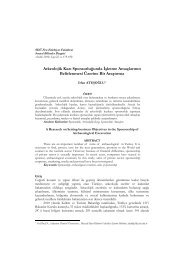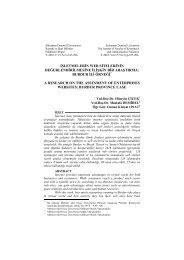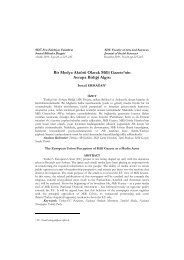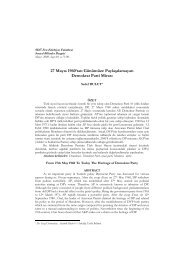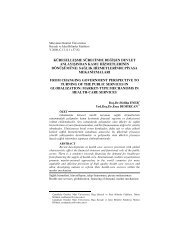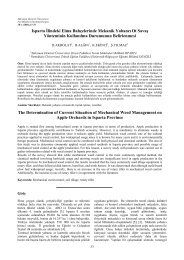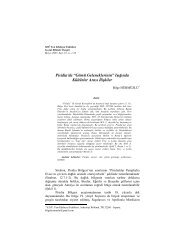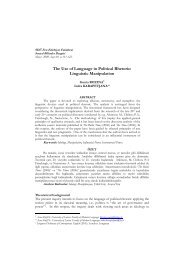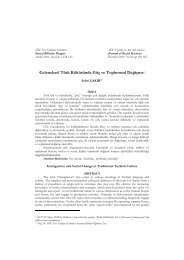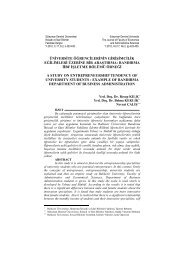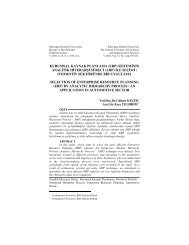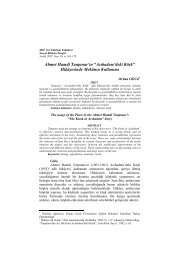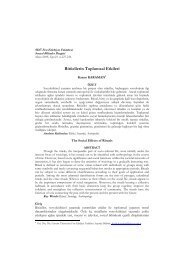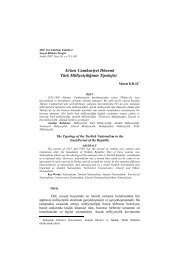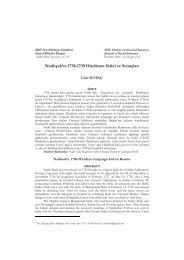Rethinking Security in the Balkans: The Concept of Weak State and ...
Rethinking Security in the Balkans: The Concept of Weak State and ...
Rethinking Security in the Balkans: The Concept of Weak State and ...
Create successful ePaper yourself
Turn your PDF publications into a flip-book with our unique Google optimized e-Paper software.
SDU Faculty <strong>of</strong> Arts <strong>and</strong> Sciences Journal <strong>of</strong> Social Sciences Special Issue on <strong>Balkans</strong><br />
<strong>Reth<strong>in</strong>k<strong>in</strong>g</strong> <strong>Security</strong> <strong>in</strong> <strong>the</strong> <strong>Balkans</strong>: <strong>The</strong> <strong>Concept</strong> <strong>of</strong> <strong>Weak</strong><br />
<strong>State</strong> <strong>and</strong> its Implications for Regional <strong>Security</strong><br />
Bülent Sarper AĞIR �<br />
ABSTRACT<br />
<strong>The</strong> nation-states are considered to have sovereign control over <strong>the</strong>ir territories.<br />
However, <strong>in</strong> weak states, empirical sovereignty <strong>of</strong> <strong>the</strong> state is questioned by several actors<br />
<strong>in</strong>side <strong>of</strong> it, especially <strong>in</strong> respect <strong>of</strong> <strong>the</strong> idea <strong>of</strong> <strong>the</strong> state. Insecurities caused by weak states such<br />
as terrorism, organized crime, refugee flows, mass migration <strong>and</strong> regional <strong>in</strong>stability have a<br />
spill-over effect. For <strong>the</strong> moment wars were over <strong>in</strong> <strong>the</strong> <strong>Balkans</strong> region, but <strong>in</strong>securities caused<br />
by weak states structures constitute an important concern for stability <strong>of</strong> <strong>the</strong> <strong>Balkans</strong>. <strong>The</strong><br />
ma<strong>in</strong> aim <strong>of</strong> this paper will be to argue that a comprehensive reth<strong>in</strong>k<strong>in</strong>g is required to exam<strong>in</strong>e<br />
security situation <strong>of</strong> <strong>the</strong> region. In this context, <strong>the</strong> concept <strong>of</strong> weak state should be given<br />
priority <strong>in</strong> assess<strong>in</strong>g <strong>the</strong> security predicament <strong>of</strong> <strong>the</strong> <strong>Balkans</strong>.<br />
Keywords: <strong>Weak</strong> <strong>State</strong>, <strong>Balkans</strong>, Non-traditional <strong>Security</strong> Issues<br />
Introduction<br />
Non-state actors <strong>and</strong> threats have become key factors for contemporary security<br />
general <strong>and</strong> <strong>the</strong> <strong>Balkans</strong> security particular. Accord<strong>in</strong>gly, Elke Krahman argues that<br />
new security threats do not target states, but societies <strong>and</strong> <strong>in</strong>dividuals. 1 <strong>The</strong>refore,<br />
issues <strong>of</strong> domestic order <strong>and</strong> stability must be given an analytical priority, because <strong>the</strong>y<br />
are <strong>the</strong> primary determ<strong>in</strong>ants <strong>of</strong> most <strong>of</strong> <strong>the</strong> conflicts. <strong>The</strong> collapse <strong>of</strong> communism,<br />
<strong>the</strong> liberalization accompanied by political <strong>and</strong> economic vacuum <strong>of</strong> <strong>the</strong> <strong>in</strong>stitutions<br />
<strong>and</strong> <strong>the</strong> number <strong>of</strong> conflicts <strong>and</strong> wars <strong>in</strong> <strong>the</strong> <strong>Balkans</strong> region led to <strong>the</strong> impoverishment<br />
<strong>of</strong> <strong>the</strong> population. <strong>The</strong>se factors also created a fertile ground for growth <strong>and</strong> spread <strong>of</strong><br />
non-traditional security issues. That’s why, with <strong>the</strong> beg<strong>in</strong>n<strong>in</strong>g <strong>of</strong> <strong>the</strong> 1990s, it is<br />
necessary to reth<strong>in</strong>k <strong>the</strong> security predicament <strong>of</strong> <strong>the</strong> <strong>Balkans</strong> region.<br />
<strong>The</strong>oretically, <strong>the</strong>re is a strong correlation between <strong>the</strong> weak state <strong>and</strong> security<br />
issues, <strong>and</strong> <strong>the</strong> challenge to stability <strong>in</strong> <strong>the</strong> <strong>Balkans</strong> comes from <strong>the</strong> presence <strong>of</strong> a cha<strong>in</strong><br />
<strong>of</strong> weak states <strong>in</strong> <strong>the</strong> region. Albania, Macedonia, Bosnia-Herzegov<strong>in</strong>a (BiH) <strong>and</strong><br />
Kosovo can be classified as weak states both <strong>in</strong> terms <strong>of</strong> neo-<strong>in</strong>stitutional <strong>and</strong><br />
ideational avenues <strong>of</strong> <strong>the</strong> conception <strong>of</strong> <strong>the</strong> weak state. In this respect, weak states <strong>of</strong><br />
<strong>the</strong> <strong>Balkans</strong> can slow down <strong>the</strong> democratization process <strong>in</strong> <strong>the</strong> region <strong>and</strong> promote<br />
reproduction <strong>of</strong> <strong>in</strong>stability <strong>and</strong> <strong>in</strong>security. This paper will analyze <strong>the</strong> relationship<br />
between <strong>the</strong> weak state phenomenon <strong>and</strong> its implications for <strong>the</strong> regional security<br />
situation <strong>in</strong> <strong>the</strong> <strong>Balkans</strong>.<br />
� Bülent Sarper Ağır is a PhD c<strong>and</strong>idate <strong>and</strong> research fellow <strong>in</strong> <strong>the</strong> Department <strong>of</strong> International Relations, Graduate<br />
School <strong>of</strong> Social Sciences, Ankara University, Ankara, Turkey. bsagir@politics.ankara.edu.tr<br />
1 Elke Krahman, “From <strong>State</strong> to Non-<strong>State</strong> Actors: <strong>The</strong> Emergence <strong>of</strong> <strong>Security</strong> Governance”, New<br />
Threats <strong>and</strong> New Actors <strong>in</strong> International <strong>Security</strong>, Elke Krahman ed., (New York: Palgrave Macmillian, 2005),<br />
p.7.
2 <strong>Reth<strong>in</strong>k<strong>in</strong>g</strong> <strong>Security</strong> <strong>in</strong> <strong>the</strong> <strong>Balkans</strong>: <strong>The</strong> <strong>Concept</strong> <strong>of</strong> <strong>Weak</strong> <strong>State</strong> <strong>and</strong> its Implications for…<br />
<strong>The</strong> weak state phenomenon <strong>in</strong> <strong>the</strong> <strong>Balkans</strong> st<strong>and</strong>s at <strong>the</strong> orig<strong>in</strong> <strong>of</strong> multiple<br />
non-traditional security threats not only to <strong>in</strong>dividuals but also to communities. <strong>The</strong><br />
weakness <strong>of</strong> <strong>the</strong> state structures <strong>in</strong> <strong>the</strong> <strong>Balkans</strong> region underp<strong>in</strong>s a number <strong>of</strong> <strong>the</strong><br />
security problems such as organised crime <strong>and</strong> corruption which <strong>in</strong>creas<strong>in</strong>gly become<br />
<strong>the</strong> ma<strong>in</strong> obstacle to economic development as military conflict dim<strong>in</strong>ishes. 2 However,<br />
<strong>in</strong> order to have a proper underst<strong>and</strong><strong>in</strong>g <strong>of</strong> weak state structures <strong>of</strong> <strong>the</strong> region, it<br />
should be stated that <strong>the</strong> economic, political, or demographic factors can seriously<br />
aggravate <strong>the</strong> underly<strong>in</strong>g ethnic or communal tensions <strong>and</strong> conflicts. So, <strong>the</strong>re is a<br />
direct causality between <strong>the</strong> absence or lack <strong>of</strong> state functions <strong>and</strong> <strong>the</strong> likelihood <strong>of</strong><br />
return<strong>in</strong>g to violence <strong>in</strong> <strong>the</strong> post-conflict environment. In this regard, both tangible<br />
<strong>and</strong> socially constructed threats to security should be tackled <strong>in</strong> an <strong>in</strong>tegrated<br />
approach. For <strong>in</strong>stance, <strong>in</strong> addition to <strong>in</strong>dividual <strong>in</strong>securities, BiH experiences<br />
radicalization <strong>and</strong> polarization tendencies <strong>in</strong> terms <strong>of</strong> ethnicity.<br />
Geopolitical space <strong>of</strong> <strong>the</strong> paper will <strong>in</strong>clude <strong>the</strong> former Yugoslavia (except for<br />
Slovenia <strong>and</strong> Croatia) <strong>and</strong> Albania, which counts six countries (Serbia, BiH,<br />
Macedonia, Albania, Montenegro <strong>and</strong> Kosovo) without focus<strong>in</strong>g on any particular<br />
one. 3 Slovenia is a member states <strong>of</strong> <strong>the</strong> EU <strong>and</strong> Croatia will be accepted as a member<br />
state <strong>in</strong> 2013. So, <strong>the</strong>se two countries are excluded from <strong>the</strong> analysis <strong>in</strong> this paper. It<br />
will not be used any geopolitical term<strong>in</strong>ology except <strong>the</strong> term “<strong>the</strong> <strong>Balkans</strong>”. Because,<br />
while <strong>the</strong> focus <strong>of</strong> <strong>the</strong> study will be on six countries mentioned above, <strong>the</strong> spillover<br />
effect <strong>of</strong> non-traditional security issues <strong>in</strong> <strong>the</strong>se countries is felt not only locally but<br />
have repercussions regionally <strong>and</strong> even beyond.<br />
1. Contemporary <strong>Security</strong> Predicament <strong>of</strong> <strong>the</strong> <strong>Balkans</strong><br />
After <strong>the</strong> end <strong>of</strong> <strong>the</strong> Yugoslav wars, it can be asserted that <strong>the</strong> potential for large scale<br />
armed conflicts <strong>in</strong> <strong>the</strong> <strong>Balkans</strong> has been, by large, dim<strong>in</strong>ished. 4 Given <strong>the</strong> presence <strong>of</strong><br />
a plethora <strong>of</strong> <strong>in</strong>ternational military forces such as SFOR, KFOR or NATO forces, it<br />
would be difficult even to imag<strong>in</strong>e an outbreak <strong>of</strong> hostilities between <strong>the</strong> states <strong>in</strong> <strong>the</strong><br />
region. <strong>The</strong>refore, it may be argued that particularly <strong>the</strong> non-military challenges are far<br />
more numerous <strong>and</strong> threaten<strong>in</strong>g. 5 Indeed, <strong>the</strong> states that emerged from Yugoslavia’s<br />
ru<strong>in</strong>s are suffer<strong>in</strong>g from non-traditional security problems. Immigration <strong>and</strong> refugee<br />
problems, terrorism, arms, drugs <strong>and</strong> human traffick<strong>in</strong>g, <strong>the</strong> spread <strong>of</strong> organized crime<br />
<strong>and</strong> corruption, are parts <strong>of</strong> such non-traditional challenges.<br />
<strong>The</strong> economic sanctions imposed by <strong>the</strong> <strong>in</strong>ternational community on <strong>the</strong><br />
Federal Republic <strong>of</strong> Yugoslavia (FRY) blocked major commercial routes <strong>and</strong> have<br />
brought tremendous loses to <strong>the</strong> neighbour<strong>in</strong>g countries. <strong>The</strong>y have created serious<br />
2 Barry Buzan <strong>and</strong> Ole Wæver, Regions <strong>and</strong> Powers: <strong>The</strong> Structure <strong>of</strong> International <strong>Security</strong>, (Cambridge:<br />
Cambridge University Press, 2003), p.384.<br />
3 Kosovo is not UN recognized state although it was recognized by 93 sovereign countries. <strong>The</strong>refore, <strong>in</strong><br />
this article, Kosovo takes place as an important actor <strong>of</strong> <strong>the</strong> regional security developments.<br />
4 Dejan Anastasijevic, “Organized Crime <strong>in</strong> <strong>the</strong> Western <strong>Balkans</strong>” HUMSEC Journal,<br />
http://www.humsec.eu/cms/fileadm<strong>in</strong>/user_upload/humsec/Work<strong>in</strong>_Paper_Series/Work<strong>in</strong>g_Paper_A<br />
nastasijevic.pdf, 10 May 2010.<br />
5 Radovan Vukad<strong>in</strong>ovic, “Challenges to <strong>Security</strong> <strong>in</strong> Sou<strong>the</strong>ast Europe”, South-East Europe Studies, Vol. 36,<br />
No. 5, 1999, p.4.
Bülent Sarper AĞIR 3<br />
<strong>in</strong>ternal problems such as grey economy, corruption, illegal trade <strong>and</strong> <strong>the</strong> appearance<br />
<strong>of</strong> crim<strong>in</strong>al conduct <strong>in</strong> <strong>the</strong> highest political structures 6 <strong>in</strong> Balkan states, <strong>of</strong>ten<br />
deteriorate <strong>the</strong> human rights situation even more.<br />
In addition to economic problems, <strong>the</strong> process <strong>of</strong> democratic transition <strong>in</strong> <strong>the</strong><br />
post-communist Balkan states creates challenges for <strong>the</strong> new governments <strong>in</strong> <strong>the</strong><br />
region. <strong>The</strong>y have just restored or ga<strong>in</strong>ed <strong>the</strong>ir <strong>in</strong>dependence <strong>and</strong> full sovereignty <strong>and</strong><br />
seek to build a homogenous nation-state, <strong>and</strong> <strong>the</strong> population with<strong>in</strong> <strong>the</strong>ir political<br />
borders consists <strong>of</strong> more than one ethnic group, each with <strong>the</strong>ir own political agendas.<br />
Thus, <strong>in</strong> <strong>the</strong> post-Cold War era, while most <strong>of</strong> <strong>the</strong> Central <strong>and</strong> Eastern European<br />
states achieved a work<strong>in</strong>g democracy <strong>and</strong> were able to ma<strong>in</strong>ta<strong>in</strong> domestic peace <strong>and</strong><br />
security, most <strong>of</strong> o<strong>the</strong>rs <strong>in</strong> <strong>the</strong> <strong>Balkans</strong> engaged <strong>in</strong> bloody wars <strong>and</strong> civil conflicts <strong>in</strong><br />
<strong>the</strong> last decade <strong>of</strong> twentieth century. So, given <strong>the</strong> multicultural diversity <strong>and</strong> <strong>the</strong><br />
history <strong>of</strong> ethnic conflicts <strong>in</strong> <strong>the</strong> region, <strong>the</strong> protection <strong>of</strong> m<strong>in</strong>orities is a major<br />
regional issue.<br />
When we talk about national security, we are talk<strong>in</strong>g about <strong>the</strong> security <strong>of</strong> a<br />
particular state, not that <strong>of</strong> its citizens. However, <strong>in</strong> order to h<strong>and</strong>le <strong>the</strong> sources <strong>of</strong><br />
<strong>in</strong>security <strong>in</strong> <strong>the</strong> <strong>Balkans</strong>, one should reth<strong>in</strong>k <strong>the</strong> <strong>in</strong>side <strong>of</strong> <strong>the</strong> state actor. Because,<br />
while all <strong>the</strong> states <strong>in</strong> <strong>Balkans</strong> possess judicial sovereignty, which is supported by<br />
<strong>in</strong>ternational community, <strong>the</strong>re are challenges to <strong>the</strong>ir authority or regimes, orig<strong>in</strong>at<strong>in</strong>g<br />
from <strong>the</strong> weakness <strong>of</strong> <strong>the</strong> state. Given its recent history <strong>of</strong> wars <strong>and</strong> cont<strong>in</strong>ued ethnic<br />
hatred <strong>and</strong> nationalism, domestic realm <strong>of</strong> security plays a prom<strong>in</strong>ent role <strong>in</strong> this<br />
region. <strong>The</strong> root causes <strong>of</strong> <strong>the</strong> conflicts, such as ethno-national aspirations <strong>and</strong><br />
discrim<strong>in</strong>atory situations, need to be taken <strong>in</strong>to account toge<strong>the</strong>r with ongo<strong>in</strong>g<br />
problems <strong>of</strong> treatment <strong>of</strong> m<strong>in</strong>orities <strong>and</strong> o<strong>the</strong>r ethnic groups. <strong>The</strong> redistribution <strong>of</strong><br />
economic growth, <strong>the</strong> access to state services, unequal liv<strong>in</strong>g st<strong>and</strong>ards, lack <strong>of</strong> respect<br />
for o<strong>the</strong>r religions <strong>and</strong> cultures play a major role <strong>in</strong> creat<strong>in</strong>g threats <strong>and</strong><br />
vulnerabilities. 7 <strong>The</strong>refore, <strong>in</strong> addition to provid<strong>in</strong>g <strong>in</strong>dividual rights, democratisation<br />
also requires recognition <strong>of</strong> collective rights for all k<strong>in</strong>ds <strong>of</strong> communities.<br />
Does <strong>the</strong> lack <strong>of</strong> strong state structures hamper democratic consolidation <strong>in</strong> <strong>the</strong><br />
<strong>Balkans</strong>? As an answer to this question, <strong>in</strong> order to <strong>in</strong>crease <strong>the</strong> chance <strong>of</strong><br />
consolidat<strong>in</strong>g democracy, <strong>the</strong> state should try to give all citizens a common ro<strong>of</strong> by<br />
grant<strong>in</strong>g an <strong>in</strong>clusive <strong>and</strong> equal citizenship. But many governments <strong>in</strong> <strong>the</strong> <strong>Balkans</strong><br />
tended to consider <strong>the</strong> existence <strong>of</strong> different communities (ethnic <strong>and</strong> political) as a<br />
threat, so <strong>the</strong>y exploited <strong>and</strong> denied citizenship <strong>and</strong> rights to <strong>the</strong> members <strong>of</strong> <strong>the</strong>se<br />
communities. In this way, especially ethnic communities cannot participate <strong>in</strong> <strong>the</strong><br />
economic, social <strong>and</strong> political life <strong>of</strong> <strong>the</strong> society. This type <strong>of</strong> exclusion may br<strong>in</strong>g <strong>the</strong><br />
state from be<strong>in</strong>g a solution to be<strong>in</strong>g a source <strong>of</strong> security problems. So, Nizar Messari<br />
6 Vera Stojarova, “Organized Crime <strong>in</strong> <strong>the</strong> Western <strong>Balkans</strong>”, HUMSEC Journal,<br />
http://www.humsec.eu/cms/fileadm<strong>in</strong>/user_upload/humsec/Journal/Stojarova_Organized_Crime_<strong>in</strong>_t<br />
he_Western_<strong>Balkans</strong>.pdf, 10 May 2010.<br />
7 Wolfgang Benedek, “<strong>The</strong> Human <strong>Security</strong> Approach to Terrorism <strong>and</strong> Organized Crime <strong>in</strong> Post-<br />
Conflict Situations”, Transnational Terrorism, Organized Crime <strong>and</strong> Peace-Build<strong>in</strong>g, Human <strong>Security</strong> <strong>in</strong> <strong>the</strong> Western<br />
<strong>Balkans</strong>, Wolfgang Benedek, Christopher Daase, Voj<strong>in</strong> Dimitrijevic <strong>and</strong> Petrus Van Duyne eds., (London:<br />
Palgrave Macmillian, 2010), p.13.
4 <strong>Reth<strong>in</strong>k<strong>in</strong>g</strong> <strong>Security</strong> <strong>in</strong> <strong>the</strong> <strong>Balkans</strong>: <strong>The</strong> <strong>Concept</strong> <strong>of</strong> <strong>Weak</strong> <strong>State</strong> <strong>and</strong> its Implications for…<br />
argues that <strong>the</strong> state can sometimes represent threats to its citizens <strong>and</strong> it is especially<br />
true for Europe as exemplified by events <strong>in</strong> <strong>the</strong> former Yugoslavia. 8<br />
That is why <strong>the</strong> object <strong>of</strong> security should not be <strong>the</strong> state, s<strong>in</strong>ce what is really<br />
threatened is not an abstraction like <strong>the</strong> state, but <strong>the</strong> material <strong>and</strong> societal well-be<strong>in</strong>g<br />
<strong>of</strong> <strong>in</strong>dividuals. 9 Intra-state conflicts <strong>and</strong> enmities <strong>in</strong> <strong>the</strong> <strong>Balkans</strong> had targeted <strong>the</strong><br />
civilians much more than any o<strong>the</strong>r actors <strong>in</strong> <strong>the</strong> aftermath <strong>of</strong> <strong>the</strong> Cold War <strong>and</strong><br />
<strong>the</strong>refore a human oriented security approach became essential both <strong>in</strong> <strong>the</strong> peace<br />
mak<strong>in</strong>g process <strong>and</strong> <strong>in</strong> security arrangements. 10 Although levels <strong>of</strong> human <strong>in</strong>security<br />
do vary from one country to ano<strong>the</strong>r <strong>in</strong> <strong>the</strong> region, it is clear that most countries share<br />
common risks <strong>and</strong> common concerns. In o<strong>the</strong>r words, while <strong>the</strong> situation is not <strong>the</strong><br />
same <strong>and</strong> has not reached <strong>the</strong> same critical levels <strong>in</strong> all countries <strong>of</strong> <strong>the</strong> region, <strong>the</strong><br />
perception is still that non-traditional security issues <strong>in</strong> <strong>the</strong> <strong>Balkans</strong> threaten <strong>the</strong><br />
democracy, <strong>the</strong> rule <strong>of</strong> law, human rights <strong>and</strong> <strong>the</strong> stability <strong>and</strong> <strong>the</strong> economic progress<br />
with<strong>in</strong> <strong>the</strong> region, even with an impact beyond <strong>the</strong> <strong>Balkans</strong>.<br />
2. <strong>The</strong> Phenomenon <strong>of</strong> <strong>the</strong> <strong>Weak</strong> <strong>State</strong><br />
It is argued that <strong>the</strong> failed state, which is solely conf<strong>in</strong>ed to <strong>the</strong> Third World, is no<br />
longer a problem. <strong>The</strong> dis<strong>in</strong>tegration <strong>of</strong> <strong>the</strong> former Yugoslavia is a strik<strong>in</strong>g example <strong>of</strong><br />
a failed state that once was one <strong>of</strong> <strong>the</strong> most liberal <strong>and</strong> affluent socialist societies <strong>in</strong><br />
Eastern Europe. 11 Accord<strong>in</strong>g to a special report commissioned by <strong>the</strong> UNDP<br />
concern<strong>in</strong>g <strong>the</strong> issue <strong>of</strong> human security <strong>in</strong> <strong>the</strong> <strong>Balkans</strong>, it is argued that human<br />
<strong>in</strong>security <strong>in</strong> <strong>the</strong> region is best expla<strong>in</strong>ed <strong>and</strong> confronted from <strong>the</strong> perspective <strong>of</strong> <strong>the</strong><br />
‘weak state’. 12<br />
<strong>The</strong> traditional conception <strong>of</strong> security does not take <strong>in</strong>to account domestic<br />
variables that affect conflict <strong>and</strong> order. So, neorealist th<strong>in</strong>k<strong>in</strong>g pays attention only to<br />
powerful states, <strong>in</strong>stead <strong>of</strong> plac<strong>in</strong>g <strong>the</strong> weak <strong>and</strong> <strong>the</strong> strong states <strong>in</strong> a <strong>the</strong>oretical<br />
framework <strong>in</strong> terms <strong>of</strong> concept <strong>of</strong> socio-political cohesion. An analysis <strong>of</strong> <strong>the</strong> weak<br />
state is necessitated by an outlook from <strong>the</strong> bottom-up that allows us to observe<br />
domestic realm <strong>of</strong> <strong>the</strong> security which is mostly related to state-society relations.<br />
Approaches to <strong>the</strong> weak state <strong>in</strong> International Relations literature have primarily<br />
taken two avenues. <strong>The</strong> first avenue is <strong>the</strong> neo-<strong>in</strong>stitutional <strong>and</strong> <strong>the</strong> second is <strong>the</strong><br />
ideational approach. <strong>The</strong> neo-<strong>in</strong>stitutional avenue focuses on <strong>the</strong> <strong>in</strong>stitutions with<strong>in</strong><br />
<strong>the</strong> state <strong>and</strong> <strong>the</strong>ir ability to govern. 13 A weak state is def<strong>in</strong>ed not merely as one with<br />
8 Nizar Messari, “<strong>The</strong> <strong>State</strong> <strong>and</strong> Dilemmas <strong>of</strong> <strong>Security</strong>: <strong>The</strong> Middle East <strong>and</strong> <strong>the</strong> <strong>Balkans</strong>”, <strong>Security</strong><br />
Dialogue, Vol. 33, No. 4, 2002, p.416.<br />
9 Simon Dalby, “Contest<strong>in</strong>g an Essential <strong>Concept</strong>: Read<strong>in</strong>g <strong>the</strong> Dilemmas <strong>in</strong> Contemporary <strong>Security</strong><br />
Discourse”, Critical <strong>Security</strong> Studies, <strong>Concept</strong>s <strong>and</strong> Cases, Keith Krause <strong>and</strong> Michael C. Williams eds.,<br />
(London: UCL Press, 1997), p.13.<br />
10 A. Şevket Ovalı, “What is to Be Done: A Complementary <strong>Security</strong> Architecture for <strong>the</strong> <strong>Balkans</strong>”, <strong>The</strong><br />
Proceed<strong>in</strong>gs <strong>of</strong> <strong>the</strong> Fourth International Conference on <strong>Security</strong>, Challenges to Balkan <strong>Security</strong> <strong>and</strong> Contribution <strong>of</strong> <strong>the</strong><br />
International Organizations, 14-15 May 2008, (İzmir: Dokuz Eylül University Press, 2009), p.171.<br />
11 Andrew L<strong>in</strong>klater, “Globalization <strong>and</strong> <strong>the</strong> Transformation <strong>of</strong> Political Community”, <strong>The</strong> Globalization <strong>of</strong><br />
World Politics: An Introduction to International Relations, John Baylis <strong>and</strong> Steve Smith ed., (Oxford: Oxford<br />
University Press, 2001), p.624.<br />
12 Ivan Krastev, Human <strong>Security</strong> <strong>in</strong> South-East Europe, (Skopje: UNDP Special Report, 1999).<br />
13 Joel S. Migdal, Strong Societies <strong>and</strong> <strong>Weak</strong> <strong>State</strong>s: <strong>State</strong>-Society Relations <strong>and</strong> <strong>State</strong> Capabilities <strong>in</strong> <strong>the</strong> Third World,<br />
(Pr<strong>in</strong>ceton: Pr<strong>in</strong>ceton University Press, 1988).
Bülent Sarper AĞIR 5<br />
<strong>in</strong>efficient <strong>in</strong>stitutions but one that is unable or unwill<strong>in</strong>g to enforce rules or to<br />
implement consistent policies. <strong>The</strong> structures <strong>of</strong> weak states encourage <strong>the</strong> threat <strong>of</strong><br />
crim<strong>in</strong>al activities <strong>and</strong> <strong>the</strong>ir pr<strong>of</strong>itability, due to <strong>the</strong> ease with which crim<strong>in</strong>al<br />
organizations are able to penetrate <strong>the</strong> state <strong>and</strong> its <strong>in</strong>stitutions. 14 <strong>The</strong> <strong>in</strong>filtration by<br />
crim<strong>in</strong>al organizations <strong>in</strong>to state structures threatens democracy, democratic<br />
<strong>in</strong>stitutions <strong>and</strong> public confidence.<br />
Dysfunction <strong>of</strong> <strong>the</strong> state has a direct impact on <strong>the</strong> fight aga<strong>in</strong>st organized<br />
crime. Thus, it seems clear that <strong>the</strong> role <strong>of</strong> ethnicity as a cause generat<strong>in</strong>g conflict is<br />
not enough to capture all violent conflicts. <strong>The</strong> ethnicity argument fails to expla<strong>in</strong> why<br />
an ethnically homogenous country, such as Albania, had violent domestic conflicts. 15<br />
<strong>The</strong> government <strong>and</strong> its apparatus are not will<strong>in</strong>g <strong>and</strong>/or able to deliver sufficient<br />
public services <strong>and</strong>/or <strong>the</strong>y suffer from severe legitimacy problems. Despite appear<strong>in</strong>g<br />
strong with regard to <strong>the</strong> monopoly <strong>of</strong> <strong>the</strong> use <strong>of</strong> force, it is <strong>in</strong> fact ra<strong>the</strong>r weak when<br />
it comes to provision <strong>of</strong> public services <strong>and</strong> <strong>in</strong> terms <strong>of</strong> its political <strong>and</strong> adm<strong>in</strong>istrative<br />
systems.<br />
<strong>The</strong> ideational avenue to study<strong>in</strong>g <strong>the</strong> weak state is a security-<strong>in</strong>spired track,<br />
which focuses on <strong>the</strong> idea <strong>of</strong> <strong>the</strong> state as a legitimate actor <strong>in</strong> provid<strong>in</strong>g protection for<br />
<strong>the</strong> population. 16 This ‘idea’ <strong>of</strong> a legitimate state is born <strong>of</strong> a bottom-up approach to<br />
societal support for <strong>the</strong> state, referred to as state-society cohesion. So, it is not<br />
sufficient to blame weak <strong>in</strong>stitutions for weak states, or objective taxonomical<br />
accounts measur<strong>in</strong>g states accord<strong>in</strong>g to <strong>the</strong> idealised Weberian model. <strong>The</strong> o<strong>the</strong>r ma<strong>in</strong><br />
approach to weak states is ideational, whereby <strong>the</strong> state constitutes an arena <strong>of</strong> conflict<br />
between <strong>the</strong> government <strong>and</strong> its citizens.<br />
As characterized by Barry Buzan, <strong>the</strong> weak state is a state where <strong>the</strong> level <strong>of</strong><br />
socio-political cohesion is low because <strong>the</strong>re is no s<strong>in</strong>gle nation with<strong>in</strong> a state territory<br />
<strong>and</strong> different ethnic groups coexist with<strong>in</strong> one state, <strong>the</strong> process <strong>of</strong> state-build<strong>in</strong>g is<br />
not accomplished <strong>and</strong> govern<strong>in</strong>g elites are concerned with domestic threats ra<strong>the</strong>r<br />
than with external ones. <strong>The</strong>re is no political <strong>and</strong> societal consensus with<strong>in</strong> a state or a<br />
coherent idea <strong>of</strong> a state among citizens <strong>and</strong> at <strong>the</strong> same time govern<strong>in</strong>g elites are not<br />
able to impose unity <strong>in</strong> <strong>the</strong> absence <strong>of</strong> such a political consensus. S<strong>in</strong>ce <strong>the</strong> process <strong>of</strong><br />
state-build<strong>in</strong>g is not accomplished <strong>in</strong> <strong>the</strong>se states <strong>and</strong> <strong>the</strong>re is no formed nation with<strong>in</strong><br />
state boundaries, i.e. population is composed <strong>of</strong> different ethnic <strong>and</strong> cultural groups<br />
<strong>and</strong> <strong>the</strong> domestic situation is characterized by violence. 17<br />
Nizar Messari argues that when <strong>the</strong> state represents a solution to <strong>the</strong> security<br />
needs <strong>of</strong> one group <strong>in</strong> <strong>the</strong> population, it constitutes by nature a source <strong>of</strong> threat to<br />
ano<strong>the</strong>r group. This is <strong>the</strong> case because <strong>the</strong> construction <strong>of</strong> <strong>the</strong> state is necessarily an<br />
exclusive process, <strong>and</strong> those who are excluded become <strong>in</strong> some cases a source <strong>of</strong><br />
threat. It is at this precise conjuncture that <strong>the</strong> concept <strong>of</strong> identity becomes central <strong>in</strong><br />
<strong>the</strong> discussion <strong>of</strong> security. 18 Indeed, <strong>the</strong> societal security is crucial, with questions <strong>of</strong><br />
14 Stojarova, op.cit., p.92.<br />
15 Dorian Jano, “How Legacies <strong>of</strong> <strong>the</strong> Past <strong>and</strong> <strong>Weak</strong>ness <strong>of</strong> <strong>the</strong> <strong>State</strong> brought Violent Dissolution <strong>and</strong><br />
Disorder to <strong>the</strong> Western Balkan <strong>State</strong>s”, Journal <strong>of</strong> Peace, Conflict <strong>and</strong> Development, Issue 14, July 2009, p.5.<br />
16 Barry Buzan, People, <strong>State</strong>s <strong>and</strong> Fear: An Agenda for International <strong>Security</strong> Studies <strong>in</strong> <strong>the</strong> Post-Cold War Era,<br />
Second Edition, (London: Harvester Wheatsheaf, 1991).<br />
17 Ibid., p. 97-101.<br />
18 Messari, op. cit., p.420.
6 <strong>Reth<strong>in</strong>k<strong>in</strong>g</strong> <strong>Security</strong> <strong>in</strong> <strong>the</strong> <strong>Balkans</strong>: <strong>The</strong> <strong>Concept</strong> <strong>of</strong> <strong>Weak</strong> <strong>State</strong> <strong>and</strong> its Implications for…<br />
national identity <strong>of</strong>ten becom<strong>in</strong>g <strong>the</strong> organis<strong>in</strong>g centre <strong>of</strong> struggle <strong>and</strong> fear. Societal<br />
<strong>in</strong>security <strong>in</strong>volves threats to <strong>the</strong> fundamental make-up <strong>of</strong> a society. <strong>The</strong>se are aspects<br />
such as values, traditions, customs, language, religion, ethnicity, etc. <strong>The</strong>se<br />
characteristics <strong>of</strong> a given group are <strong>of</strong>ten referred to as identity. When speak<strong>in</strong>g <strong>of</strong><br />
societal dimensions <strong>of</strong> security, we thus commonly refer to threats to <strong>the</strong> identity <strong>of</strong> a<br />
particular group. In Balkan states, both avenues <strong>of</strong> <strong>the</strong> weak state concept can easily<br />
observed. While neo-<strong>in</strong>stitutional avenue <strong>of</strong> <strong>the</strong> concept is mostly related to statebuild<strong>in</strong>g<br />
process <strong>of</strong> post-conflict societies, ideational avenue necessiates an approach<br />
that h<strong>and</strong>le state-society relations <strong>and</strong> relatedly socio-political cohesion issue.<br />
<strong>The</strong> reality <strong>of</strong> war with<strong>in</strong> states does not correspond with Clausewitz’s th<strong>in</strong>k<strong>in</strong>g<br />
<strong>of</strong> war as an organized combat between <strong>the</strong> military forces <strong>of</strong> two <strong>and</strong>/or more<br />
different states. Wars with<strong>in</strong> states are fought over issues <strong>of</strong> statehood <strong>and</strong> relations<br />
among communities with<strong>in</strong> states. For Mary Kaldor, new wars are usually fought not<br />
for reasons <strong>of</strong> state or ideology, but for identity <strong>and</strong> most violence is directed aga<strong>in</strong>st<br />
civilians -that is absolutely central to underst<strong>and</strong><strong>in</strong>g new wars. 19 Social <strong>and</strong> political<br />
fragmentation <strong>and</strong> weak <strong>in</strong>ter-group trust are <strong>of</strong>ten characteristics <strong>of</strong> situations <strong>of</strong><br />
fragility <strong>and</strong> violent conflict. In situations <strong>of</strong> fragility, political identity, fragmentation<br />
<strong>and</strong> weak state <strong>in</strong>stitutions re<strong>in</strong>force each o<strong>the</strong>r. <strong>The</strong>y underm<strong>in</strong>e state legitimacy <strong>and</strong><br />
<strong>the</strong> formation <strong>of</strong> strong nation-wide governance systems; <strong>and</strong> divide citizens. In<br />
situations <strong>of</strong> violent conflict, processes <strong>of</strong> ‘o<strong>the</strong>r<strong>in</strong>g’ <strong>and</strong> dehumanisation destroy<br />
social relations <strong>and</strong> networks <strong>and</strong> leave a legacy <strong>of</strong> deep mistrust <strong>and</strong> fear <strong>of</strong> o<strong>the</strong>rs.<br />
Persistent divisions <strong>in</strong> <strong>the</strong> aftermath <strong>of</strong> conflict result <strong>in</strong> an unstable peace <strong>and</strong> <strong>the</strong><br />
possibility <strong>of</strong> renewed violence.<br />
3. Non-Traditional <strong>Security</strong> Challenges <strong>in</strong> <strong>the</strong> <strong>Balkans</strong><br />
Despite some differences <strong>in</strong> <strong>the</strong> terms <strong>in</strong>tensity, perceptions <strong>of</strong> <strong>the</strong> ma<strong>in</strong> security<br />
threats are strik<strong>in</strong>gly similar <strong>in</strong> all countries <strong>of</strong> <strong>the</strong> region. 20 For example, <strong>the</strong> National<br />
<strong>Security</strong> <strong>and</strong> Defence <strong>Concept</strong> <strong>of</strong> Macedonia 2003 def<strong>in</strong>es terrorism, organised crime,<br />
illegal migration, illegal traffick<strong>in</strong>g <strong>in</strong> drugs, weapons, people, strategic <strong>and</strong> two-fold<br />
use materials <strong>and</strong> corruption as threats to national security. 21 In <strong>the</strong> same way, <strong>the</strong><br />
2008 National <strong>Security</strong> Strategy <strong>of</strong> Montenegro lists <strong>the</strong> follow<strong>in</strong>g threats: smuggl<strong>in</strong>g<br />
<strong>of</strong> drugs <strong>and</strong> weapons, illegal migration, human traffick<strong>in</strong>g <strong>and</strong> proliferation <strong>of</strong><br />
weapons <strong>of</strong> mass destruction. 22 It can be easily observed that a large number <strong>of</strong> threats<br />
come from <strong>the</strong> non-traditional security sectors when one exam<strong>in</strong>es <strong>the</strong> security<br />
strategy documents <strong>of</strong> <strong>the</strong> states <strong>in</strong> <strong>the</strong> region. This is an <strong>in</strong>dicator <strong>of</strong> <strong>the</strong> weakness <strong>of</strong><br />
state <strong>in</strong>stitutions <strong>and</strong> it implies <strong>the</strong> phenomenon <strong>of</strong> a weak state which is l<strong>in</strong>ked to<br />
almost all security threats that affect <strong>the</strong> countries <strong>in</strong> <strong>the</strong> region.<br />
19 Mary Kaldor <strong>and</strong> Alan Johnson, “New Wars <strong>and</strong> Human <strong>Security</strong>: An Interview with Mary Kaldor”,<br />
http://dissentmagaz<strong>in</strong>e.org/democratiya/article_pdfs/d11Kaldor.pdf, 12 May 2010.<br />
20 Istvan Gyarmati <strong>and</strong> Darko Stancic, Study on <strong>the</strong> Assessment <strong>of</strong> Regional <strong>Security</strong> Threats <strong>and</strong> Challenges <strong>in</strong> <strong>the</strong><br />
Western <strong>Balkans</strong>, (Geneva: Geneva Centre for <strong>the</strong> Democratic Control <strong>of</strong> Armed Forces, 2007), p.2.<br />
21 Islam Yusufi, “Macedonia”, <strong>Security</strong> Policies <strong>in</strong> <strong>the</strong> Western <strong>Balkans</strong>, Miroslav Hadzic, Milorad Timotic <strong>and</strong><br />
Predrag Petrovic ed., (Belgrade: Center for Civil-Military Relations, 2010), p.106-107.<br />
22 Rajko Radevic, “Montenegro”, <strong>Security</strong> Policies <strong>in</strong> <strong>the</strong> Western <strong>Balkans</strong>, Miroslav Hadzic, Milorad Timotic<br />
<strong>and</strong> Predrag Petrovic ed., (Belgrade: Center for Civil-Military Relations, 2010), p.129.
Bülent Sarper AĞIR 7<br />
3.1. Organized Crime<br />
<strong>The</strong> spread <strong>and</strong> growth <strong>of</strong> <strong>the</strong> forces <strong>of</strong> organized crime is certa<strong>in</strong>ly one <strong>of</strong> <strong>the</strong> most<br />
significant security risks <strong>in</strong> <strong>the</strong> <strong>Balkans</strong>. <strong>The</strong> transition from communist rule to<br />
democracy, wars <strong>in</strong> <strong>the</strong> <strong>Balkans</strong> region <strong>in</strong> <strong>the</strong> 1990s with <strong>the</strong>ir economic blockades<br />
<strong>and</strong> war economies, <strong>and</strong> <strong>the</strong> presence <strong>of</strong> weak states <strong>in</strong> <strong>the</strong> post-war context provided<br />
a favourable environment for networks <strong>of</strong> organized crime to bloom. 23 So, <strong>the</strong><br />
phenomenon <strong>of</strong> crime <strong>in</strong> <strong>the</strong> region is a product <strong>of</strong> post-communist transition <strong>and</strong><br />
conflicts result<strong>in</strong>g from <strong>the</strong> break-up <strong>of</strong> Yugoslavia ra<strong>the</strong>r than be<strong>in</strong>g endemic. But it<br />
should be emphasised that societal problems <strong>and</strong> <strong>the</strong> weakness <strong>of</strong> <strong>the</strong> state actor<br />
contributed to <strong>the</strong> growth <strong>of</strong> organized crime networks. <strong>The</strong>refore, organized crime is<br />
not only a developmental issue <strong>in</strong> <strong>the</strong> <strong>Balkans</strong>, reflect<strong>in</strong>g <strong>the</strong> lack <strong>of</strong> adequately<br />
protected property rights <strong>and</strong> <strong>the</strong> lack <strong>of</strong> local employment opportunities. <strong>The</strong><br />
regional organized crime networks f<strong>in</strong>d <strong>the</strong>ir expression <strong>in</strong> <strong>the</strong> traffick<strong>in</strong>g <strong>of</strong> illicit<br />
goods (such as arms <strong>and</strong> drugs), economic crime, money launder<strong>in</strong>g, <strong>the</strong> organisation<br />
<strong>of</strong> illegal immigration <strong>and</strong> human traffick<strong>in</strong>g.<br />
<strong>The</strong> problem <strong>of</strong> organized crime <strong>in</strong> <strong>the</strong> <strong>Balkans</strong> knows no borders <strong>and</strong> has no<br />
ethnic, nationalistic or any o<strong>the</strong>r obstacles for a jo<strong>in</strong>t action. Indeed, ethnic affiliation<br />
did not prevent crim<strong>in</strong>al groups from active cooperation with o<strong>the</strong>r groups com<strong>in</strong>g<br />
from <strong>the</strong> hostile camps <strong>in</strong> BiH or from o<strong>the</strong>r states <strong>in</strong> <strong>the</strong> region. 24 As Misha Glenny<br />
shows that <strong>the</strong> most strik<strong>in</strong>g th<strong>in</strong>g about organized crime <strong>in</strong> <strong>the</strong> <strong>Balkans</strong> is its<br />
transnational character, draw<strong>in</strong>g toge<strong>the</strong>r ‘mafia’ type structures from across <strong>the</strong><br />
region regardless <strong>of</strong> nationalities. 25<br />
Exploit<strong>in</strong>g chaos, <strong>in</strong>security, lack <strong>of</strong> proper organization <strong>and</strong> nonexistence <strong>of</strong><br />
<strong>the</strong> rule <strong>of</strong> law, organized crime networks have established <strong>the</strong>ir strongholds <strong>in</strong> <strong>the</strong><br />
region <strong>and</strong> created l<strong>in</strong>ks with high-ranked political <strong>of</strong>ficials <strong>and</strong> parts <strong>of</strong> <strong>the</strong> military<br />
establishments. 26 Organized crime’s structures are <strong>in</strong>terl<strong>in</strong>ked with <strong>the</strong> state apparatus<br />
<strong>and</strong> present a real threat not only for <strong>in</strong>dividuals, but for <strong>the</strong> state. Crim<strong>in</strong>al gangs<br />
attached to political elites <strong>in</strong> <strong>the</strong> various states threaten <strong>the</strong>ir transformation, <strong>the</strong>ir<br />
democratization <strong>and</strong> <strong>the</strong> process <strong>of</strong> <strong>in</strong>tegration <strong>in</strong>to Euro-Atlantic structures. 27 It is<br />
claimed that organized crime is still <strong>of</strong>ten l<strong>in</strong>ked with (persons <strong>in</strong>) state <strong>in</strong>stitutions<br />
<strong>and</strong> that because <strong>of</strong> <strong>the</strong> nature <strong>of</strong> <strong>the</strong> weak states <strong>in</strong> <strong>the</strong> <strong>Balkans</strong>. 28 Under <strong>the</strong>se<br />
conditions, <strong>the</strong> fight aga<strong>in</strong>st organized crime faces many problems such as <strong>the</strong><br />
reluctance <strong>of</strong> local organs to deal with <strong>the</strong> crim<strong>in</strong>al structures <strong>and</strong> <strong>in</strong>volvement by <strong>the</strong><br />
political elite <strong>in</strong> illegal activities.<br />
<strong>The</strong> activities <strong>of</strong> organized crime such as traffick<strong>in</strong>g <strong>in</strong> drugs, human be<strong>in</strong>gs,<br />
<strong>and</strong> weapons are <strong>in</strong>tertw<strong>in</strong>ed, <strong>and</strong> <strong>the</strong>y are deeply embedded <strong>in</strong> <strong>the</strong> pervasive culture<br />
<strong>of</strong> corruption <strong>in</strong> <strong>the</strong> region. In most countries <strong>of</strong> <strong>the</strong> region corruption is endemic,<br />
systematic <strong>and</strong> well organized, <strong>and</strong> has taken root <strong>in</strong> state <strong>in</strong>stitutions <strong>of</strong> power,<br />
23 Stojarova, op. cit., p.91.<br />
24 Ibid., p.96.<br />
25 Misha Glenny, “Balkan Organized Crime”, Is <strong>The</strong>re An Albanian Question?, Judy Batt ed., (Paris: Institute<br />
for <strong>Security</strong> Studies, 2008), p.87-104.<br />
26 Vukad<strong>in</strong>ovic, op. cit., p.13.<br />
27 Stojarova, op. cit., p.111.<br />
28 Benedek, op. cit., p.10.
8 <strong>Reth<strong>in</strong>k<strong>in</strong>g</strong> <strong>Security</strong> <strong>in</strong> <strong>the</strong> <strong>Balkans</strong>: <strong>The</strong> <strong>Concept</strong> <strong>of</strong> <strong>Weak</strong> <strong>State</strong> <strong>and</strong> its Implications for…<br />
<strong>in</strong>clud<strong>in</strong>g <strong>the</strong> judiciary, police <strong>and</strong> secret services. 29 So, most countries <strong>of</strong> <strong>the</strong> region<br />
regard corruption to be among <strong>the</strong>ir greatest problems. Corruption is closely tied to<br />
organized crime, <strong>and</strong> this l<strong>in</strong>k creates an even bigger problem for states to address,<br />
especially when both f<strong>in</strong>d <strong>in</strong>roads <strong>in</strong>to state structures. Because, crime groups<br />
promot<strong>in</strong>g a culture <strong>of</strong> corruption can have a deleterious impact on <strong>the</strong> social<br />
cohesion <strong>of</strong> states, widespread corruption <strong>of</strong>ten leads to a breakdown <strong>of</strong> <strong>the</strong> trust <strong>and</strong><br />
legitimacy people have <strong>in</strong> states. 30 <strong>The</strong> Corruption Perception Index <strong>of</strong> Transparency<br />
International shows Macedonia on rank 72, Serbia, Albania <strong>and</strong> Montenegro equally<br />
on rank 85 <strong>and</strong> BiH on rank 92. Kosovo does not figure <strong>in</strong> this <strong>in</strong>dex. 31 If left<br />
unaddressed, corruption <strong>and</strong> organized crime are likely to lead to state failure, as we<br />
have already witnessed <strong>in</strong> <strong>the</strong> <strong>Balkans</strong>.<br />
3.2. Terrorism<br />
Terrorism may easily f<strong>in</strong>d fertile soil <strong>in</strong> national <strong>and</strong> ethnic conflicts, as well as <strong>in</strong> <strong>the</strong><br />
consequences <strong>of</strong> recently ended wars. M<strong>in</strong>ority groups, if unsatisfied with <strong>the</strong>ir status,<br />
or streng<strong>the</strong>ned nationalist movements may easily become <strong>the</strong> organizers <strong>of</strong> terrorist<br />
activities. 32 From <strong>the</strong> viewpo<strong>in</strong>t <strong>of</strong> Western researchers <strong>and</strong> policy analysts <strong>the</strong> threat<br />
<strong>of</strong> terrorism <strong>in</strong> <strong>the</strong> region <strong>of</strong> <strong>Balkans</strong> stems ma<strong>in</strong>ly from <strong>the</strong> aftermath <strong>of</strong> <strong>the</strong> Bosnian<br />
wars <strong>and</strong> <strong>the</strong> fact that as result <strong>of</strong> <strong>the</strong>se wars radical Islam has entered <strong>the</strong> Bosnian <strong>and</strong><br />
o<strong>the</strong>r Balkan areas through different routes. In particular after September 11 concerns<br />
have been raised as regards <strong>the</strong> possible <strong>in</strong>filtration <strong>of</strong> Balkan countries by<br />
<strong>in</strong>ternational terrorist groups, among which Al Qaeda <strong>of</strong> course figures prom<strong>in</strong>ently. 33<br />
In this context, it is argued that Albania faces a fur<strong>the</strong>r threat as different<br />
Islamic terrorist organizations attempt to take advantage <strong>of</strong> <strong>the</strong> power vacuum <strong>and</strong> use<br />
Albania as a safe haven for <strong>the</strong>ir plann<strong>in</strong>g <strong>and</strong> preparation activity – a strategic risk not<br />
just for Albania but for <strong>the</strong> region as a whole. 34 On <strong>the</strong> o<strong>the</strong>r h<strong>and</strong>, it is argued <strong>in</strong> a<br />
critical manner <strong>of</strong> above-mentioned argument, while Al Qaeda <strong>and</strong> o<strong>the</strong>r Islamic<br />
militants tried to establish <strong>the</strong>ir presence <strong>in</strong> <strong>the</strong> Muslim-populated parts <strong>of</strong> former<br />
Yugoslavia, such as Bosnia, Kosovo, <strong>and</strong> S<strong>and</strong>zak, <strong>the</strong>y were rejected by <strong>the</strong> locals,<br />
who mostly see religion as a matter <strong>of</strong> ethnic identification, not faith. 35 Whilst on 17<br />
October 2001 <strong>the</strong> Embassies <strong>of</strong> <strong>the</strong> United <strong>State</strong>s <strong>and</strong> <strong>the</strong> United K<strong>in</strong>gdom <strong>in</strong><br />
Sarajevo were closed down under threat <strong>of</strong> terrorist attacks, 36 <strong>in</strong> 2004 <strong>the</strong> International<br />
29 Gyarmati <strong>and</strong> Stancic, op. cit., p.2.<br />
30 John T. Picarelli, “Transnational Organized Crime”, <strong>Security</strong> Studies: An Introduction, Paul D. Williams<br />
ed., (London: Routledge, 2008), p.463.<br />
31 Transparency International, Corruption Perception Index 2008,<br />
http://www.transparency.org/news_room/<strong>in</strong>_focus/2008/cpi2008/cpi_2008_table, 10 May 2012.<br />
32 Vukad<strong>in</strong>ovic, op. cit., p.12.<br />
33 International Crisis Group, B<strong>in</strong> Laden <strong>and</strong> <strong>the</strong> <strong>Balkans</strong>: <strong>The</strong> Politics <strong>of</strong> Anti-Terrorism, ICG Balkan Reports,<br />
9 November 2001, no. 119, http://www.crisisgroup.org/~/media/Files/europe/<strong>Balkans</strong>%202, 10 May<br />
2012.<br />
34 Krastev, op. cit., p.16.<br />
35 Dejan Anastasijevic, “Gett<strong>in</strong>g Better? A Map <strong>of</strong> Organized Crime <strong>in</strong> <strong>the</strong> Western <strong>Balkans</strong>”,<br />
Transnational Terrorism, Organized Crime <strong>and</strong> Peace-Build<strong>in</strong>g, Human <strong>Security</strong> <strong>in</strong> <strong>the</strong> Western <strong>Balkans</strong>, Wolfgang<br />
Benedek, Christopher Daase, Voj<strong>in</strong> Dimitrijevic <strong>and</strong> Petrus Van Duyne eds., (London: Palgrave<br />
Macmillian, 2010), p.151.<br />
36 Lyubov G. M<strong>in</strong>cheva <strong>and</strong> Ted Robert Gurr, “Unholy Alliances: Evidence on L<strong>in</strong>kages between Trans-<br />
<strong>State</strong> Terrorism <strong>and</strong> Crime Networks: <strong>The</strong> Case <strong>of</strong> Bosnia”, Transnational Terrorism, Organized Crime <strong>and</strong>
Bülent Sarper AĞIR 9<br />
Strategic Studies Association came forward with allegations that <strong>the</strong> London <strong>and</strong><br />
Madrid bomb<strong>in</strong>gs had l<strong>in</strong>ks to Bosnia. 37 Under <strong>the</strong> effect <strong>of</strong> such allegations, terrorism<br />
is considered by Bosnia’s national security policy as one <strong>of</strong> <strong>the</strong> highest threats for <strong>the</strong><br />
stability <strong>of</strong> both <strong>the</strong> region <strong>and</strong> BiH. 38<br />
<strong>The</strong> dist<strong>in</strong>ction between organized crime <strong>and</strong> terrorism is made by reference to<br />
<strong>the</strong>ir ends: crim<strong>in</strong>als seek pr<strong>of</strong>its while terrorists have political motives <strong>and</strong> specifically<br />
seek to weaken <strong>the</strong> state. <strong>The</strong> existence <strong>of</strong> trans-state nationalist, ethnic, <strong>and</strong> religious<br />
movements <strong>and</strong> <strong>the</strong>ir transborder identity networks provide sett<strong>in</strong>gs conductive to<br />
collaboration between terrorists <strong>and</strong> crim<strong>in</strong>als. This collaboration between organized<br />
crime <strong>and</strong> terrorism has eroded <strong>the</strong> respect for <strong>the</strong> rule <strong>of</strong> law. Both underm<strong>in</strong>e<br />
confidence <strong>in</strong> state structures <strong>and</strong> threaten <strong>the</strong> security <strong>of</strong> <strong>in</strong>dividuals <strong>and</strong><br />
communities. Vera Stojarova claims that demilitarization <strong>of</strong> <strong>the</strong> KLA <strong>and</strong> <strong>the</strong> creation<br />
<strong>of</strong> political parties <strong>and</strong> military <strong>and</strong> police forces <strong>in</strong>volv<strong>in</strong>g <strong>the</strong> members <strong>of</strong> <strong>the</strong> KLA<br />
have provided only a partial solution to <strong>the</strong> question <strong>of</strong> <strong>the</strong> existence <strong>of</strong> <strong>the</strong> KLA. 39<br />
High unemployment <strong>and</strong> <strong>the</strong> low st<strong>and</strong><strong>in</strong>g <strong>of</strong> <strong>the</strong> law are <strong>the</strong> reasons that most former<br />
KLA fighters have found it easy to slide <strong>in</strong>to organized crime.<br />
3.3. Small Arms <strong>and</strong> Light Weapons<br />
<strong>The</strong> widespread availability <strong>and</strong> misuse <strong>of</strong> small arms <strong>and</strong> light weapons (SALW)<br />
contributes to conflicts <strong>of</strong> all types, <strong>and</strong> is closely related to current concerns such as<br />
weak <strong>and</strong> collapsed states, human rights abuses, <strong>and</strong> <strong>the</strong> pan<strong>the</strong>on <strong>of</strong> both traditional<br />
<strong>and</strong> nontraditional security issues. 40 In this context, <strong>the</strong> wars <strong>in</strong> former Yugoslavia left<br />
massive quantities <strong>of</strong> weapons <strong>and</strong> o<strong>the</strong>r military hardware outside <strong>of</strong> effective<br />
government control. In addition, great numbers <strong>of</strong> firearms were imported <strong>in</strong>to <strong>the</strong><br />
region dur<strong>in</strong>g <strong>the</strong> Yugoslav conflicts. <strong>The</strong> partial collapse <strong>of</strong> <strong>the</strong> Albanian state <strong>in</strong> 1997<br />
also fuelled <strong>the</strong> smuggl<strong>in</strong>g <strong>of</strong> weapons <strong>in</strong> <strong>the</strong> region. <strong>The</strong> situation has certa<strong>in</strong>ly much<br />
improved s<strong>in</strong>ce <strong>the</strong> time <strong>of</strong> active conflicts. Firearms traffick<strong>in</strong>g is not even mentioned<br />
<strong>in</strong> <strong>the</strong> Council <strong>of</strong> Europe’s situation reports on organised crime <strong>in</strong> <strong>the</strong> region. 41 But<br />
Iztok Prezelj emphasises that any major political <strong>and</strong> security destabilization could<br />
immediately revert <strong>the</strong> o<strong>the</strong>rwise positive trend <strong>in</strong> <strong>the</strong> field <strong>of</strong> small arms <strong>and</strong> light<br />
weapons. 42<br />
Peace-Build<strong>in</strong>g, Human <strong>Security</strong> <strong>in</strong> <strong>the</strong> Western <strong>Balkans</strong>, Wolfgang Benedek, Christopher Daase, Voj<strong>in</strong><br />
Dimitrijevic <strong>and</strong> Petrus Van Duyne eds., (London: Palgrave Macmillian, 2010), p.202.<br />
37 International Strategic Studies Association, Madrid Bomb<strong>in</strong>gs Highlight Extent <strong>and</strong> Capability <strong>of</strong> Islamist<br />
Networks, 2004, http://128.121.186.47/ISSA/reports/Balkan/Mar1204.htm, 17 May 2012.<br />
38 Olga Pal<strong>in</strong>kasev, “View from Bosnia <strong>and</strong> Herzegov<strong>in</strong>a - Study on <strong>the</strong> Assessment <strong>of</strong> Regional <strong>Security</strong><br />
Threats <strong>and</strong> Challenges <strong>in</strong> <strong>the</strong> Western <strong>Balkans</strong>”, Study on <strong>the</strong> Assessment <strong>of</strong> Regional <strong>Security</strong> Threats <strong>and</strong><br />
Challenges <strong>in</strong> <strong>the</strong> Western <strong>Balkans</strong>, Istvan Gyarmati <strong>and</strong> Darko Stancic eds., (Geneva: Geneva Centre for <strong>the</strong><br />
Democratic Control <strong>of</strong> Armed Forces, 2007), p.79.<br />
39 Stojarova, op. cit., p.102.<br />
40 Mike Bourne, “<strong>The</strong> Proliferation <strong>of</strong> Small Arms <strong>and</strong> Light Weapons”, New Threats <strong>and</strong> New Actors <strong>in</strong><br />
International <strong>Security</strong>, Elke Krahman ed., (New York: Palgrave Macmillian, 2005), p.155.<br />
41 United Nations Office on Drug <strong>and</strong> Crime, Crime <strong>and</strong> its Impact on <strong>the</strong> <strong>Balkans</strong> <strong>and</strong> Affected Countries,<br />
March 2008, p. 84, http://www.unodc.org/documents/Balkan_study.pdf, 12 May 2012.<br />
42 Iztok Prezelj, “<strong>The</strong> Small Arms <strong>and</strong> Light Weapons Problem <strong>in</strong> <strong>the</strong> Western <strong>Balkans</strong>”, Transnational<br />
Terrorism, Organized Crime <strong>and</strong> Peace-Build<strong>in</strong>g, Human <strong>Security</strong> <strong>in</strong> <strong>the</strong> Western <strong>Balkans</strong>, Wolfgang Benedek,<br />
Christopher Daase, Voj<strong>in</strong> Dimitrijevic <strong>and</strong> Petrus Van Duyne eds., (London: Palgrave Macmillian, 2010),<br />
p.207-226.
10 <strong>Reth<strong>in</strong>k<strong>in</strong>g</strong> <strong>Security</strong> <strong>in</strong> <strong>the</strong> <strong>Balkans</strong>: <strong>The</strong> <strong>Concept</strong> <strong>of</strong> <strong>Weak</strong> <strong>State</strong> <strong>and</strong> its Implications for…<br />
In <strong>the</strong> environment <strong>of</strong> high unemployment, wild privatization, fast<br />
democratization, weak governments, corruption, unsolved war-related issues, pa<strong>in</strong>ful<br />
memories, war crim<strong>in</strong>als mov<strong>in</strong>g freely <strong>and</strong> <strong>in</strong>ternally displaced people <strong>and</strong> refuges<br />
who do not want to or cannot return, <strong>the</strong> availability <strong>of</strong> SALWs may create some<br />
alternative w<strong>in</strong>dows <strong>of</strong> opportunity for solv<strong>in</strong>g problems by violence. 43 <strong>The</strong> key<br />
victims <strong>of</strong> proliferation <strong>of</strong> SALWs are actually <strong>in</strong>dividuals <strong>in</strong> <strong>the</strong> region. S<strong>in</strong>ce, <strong>in</strong> <strong>the</strong><br />
<strong>Balkans</strong> region, SALWs still cont<strong>in</strong>ue to be a problem <strong>in</strong> <strong>the</strong> post-conflict time,<br />
analysis <strong>of</strong> national security documents <strong>of</strong> countries <strong>of</strong> <strong>the</strong> region shows that many<br />
documents <strong>in</strong>dicated <strong>the</strong> illegal trade with <strong>and</strong> availibility <strong>of</strong> conventional weapons as<br />
a security threat.<br />
3.4. Demographics Dynamics <strong>of</strong> <strong>Security</strong> <strong>and</strong> Human-Traffick<strong>in</strong>g<br />
Demographic dynamics <strong>and</strong> population movements have important ramifications for<br />
human security. Serious human security concerns persist <strong>in</strong> <strong>the</strong> form <strong>of</strong> displaced<br />
persons fac<strong>in</strong>g poverty, unemployment <strong>and</strong> limited access to such social benefits as<br />
education, justice <strong>and</strong> freedom <strong>of</strong> movement. <strong>The</strong>refore, <strong>the</strong> forced migration <strong>of</strong><br />
refugees <strong>and</strong> Internally Displaced Persons (IDPs) are severe destabiliz<strong>in</strong>g factors for<br />
<strong>the</strong> Balkan region. Displacement became a serious issue <strong>in</strong> <strong>the</strong> <strong>Balkans</strong> after millions<br />
<strong>of</strong> refugees <strong>and</strong> IDPs were littered across <strong>the</strong> region (<strong>the</strong> majority <strong>in</strong> BiH, Kosovo,<br />
<strong>and</strong> Serbia) as a result <strong>of</strong> <strong>the</strong> wars <strong>in</strong> <strong>the</strong> 1990s <strong>and</strong> dur<strong>in</strong>g <strong>the</strong> 2001 <strong>in</strong>ternal strife <strong>in</strong><br />
Macedonia. In spite <strong>of</strong> efforts for solv<strong>in</strong>g human displacement, accord<strong>in</strong>g to <strong>the</strong> UN<br />
Refugee Agency (UNHCR), as <strong>of</strong> January 2009 <strong>the</strong>re were 132,071 refugees <strong>and</strong><br />
352,905 IDPs rema<strong>in</strong><strong>in</strong>g <strong>in</strong> <strong>the</strong> Western <strong>Balkans</strong>. 44<br />
Connected to demographic security <strong>of</strong> <strong>the</strong> region, human-traffick<strong>in</strong>g is ano<strong>the</strong>r<br />
non-traditional security issue. Human traffick<strong>in</strong>g is perceived as a grave human rights<br />
abuse <strong>and</strong> a serious transnational crime. 45 <strong>The</strong> destruction <strong>of</strong> social fabric caused by<br />
<strong>the</strong> war, coupled with massive migrations, <strong>and</strong> <strong>the</strong> economic collapse, worked<br />
toge<strong>the</strong>r to create fertile ground for dealers <strong>in</strong> human be<strong>in</strong>gs. <strong>The</strong> <strong>Balkans</strong> is<br />
simultaneously <strong>the</strong> source <strong>and</strong> <strong>the</strong> transit route <strong>of</strong>, <strong>and</strong> <strong>the</strong> dest<strong>in</strong>ation for <strong>the</strong><br />
traffick<strong>in</strong>g <strong>of</strong> human be<strong>in</strong>gs, who largely fall <strong>in</strong> two categories: women, used for sex<br />
traffick<strong>in</strong>g, <strong>and</strong> illegal migrants, head<strong>in</strong>g for Western countries. <strong>The</strong> International<br />
Organization <strong>of</strong> Migration estimates that 120,000 women <strong>and</strong> children are trafficked<br />
through <strong>the</strong> <strong>Balkans</strong> alone each year. 46<br />
Conclusion<br />
<strong>The</strong>re is an assumption that politico-economic reconstruction def<strong>in</strong>ed as<br />
streng<strong>the</strong>n<strong>in</strong>g <strong>of</strong> <strong>the</strong> state <strong>and</strong> <strong>in</strong>troduction <strong>of</strong> market economy can automatically<br />
foster susta<strong>in</strong>able peace. But rebuild<strong>in</strong>g a state after a conflict is about far more than<br />
repair<strong>in</strong>g damaged build<strong>in</strong>gs <strong>and</strong> re-establish<strong>in</strong>g public <strong>in</strong>stitutions. Fundamentally, it<br />
43 Prezelj, op. cit., p.210.<br />
44 Assess<strong>in</strong>g Human <strong>Security</strong> <strong>in</strong> <strong>the</strong> Western <strong>Balkans</strong>, CSIS-EKEM Policy Report, November 2010,<br />
http://csis.org/files/publication/101105.CSIS-EKEM_PolicyBrief4.pdf, 12 May 2010.<br />
45 Alja Klopcic, “Traffick<strong>in</strong>g <strong>in</strong> Human Be<strong>in</strong>gs <strong>in</strong> Transition <strong>and</strong> Post-Conflict Countries”, Human <strong>Security</strong><br />
Perspectives, Vol. 1, No. 1, 2004, p.11.<br />
46 Crime <strong>and</strong> its Impact on <strong>the</strong> <strong>Balkans</strong> <strong>and</strong> Affected Countries, op. cit., p.75.
Bülent Sarper AĞIR 11<br />
is about restor<strong>in</strong>g <strong>the</strong> people’s trust <strong>and</strong> confidence <strong>in</strong> governance systems <strong>and</strong> <strong>the</strong><br />
rule <strong>of</strong> law, rebuild<strong>in</strong>g relationships at all levels, <strong>and</strong> provid<strong>in</strong>g <strong>the</strong> population with<br />
greater hope for <strong>the</strong> future. <strong>The</strong>se processes are all critical to <strong>the</strong> consolidation <strong>of</strong><br />
peace <strong>and</strong> security <strong>in</strong> fragile post-conflict situations. When <strong>the</strong>y are neglected, <strong>the</strong> reemerg<strong>in</strong>g<br />
threat <strong>of</strong> conflict is very real.<br />
<strong>The</strong> streng<strong>the</strong>n<strong>in</strong>g <strong>of</strong> weak states is dependent on <strong>the</strong> success <strong>of</strong> state-build<strong>in</strong>g<br />
proccesses. And state-build<strong>in</strong>g proccesses <strong>of</strong> <strong>the</strong> weak states <strong>in</strong> <strong>the</strong> <strong>Balkans</strong> are closely<br />
related to <strong>the</strong> European <strong>in</strong>tegration proccess <strong>of</strong> <strong>the</strong> region. But most <strong>of</strong> <strong>the</strong> threats<br />
target<strong>in</strong>g <strong>the</strong> physical <strong>in</strong>tegrity <strong>and</strong> dignity <strong>of</strong> human be<strong>in</strong>gs are locally produced <strong>and</strong><br />
unique to <strong>the</strong> region. <strong>The</strong>refore, it is argued that a bottom-up approach which would<br />
provide participation <strong>of</strong> civil society <strong>in</strong> agenda-mak<strong>in</strong>g process ra<strong>the</strong>r than sett<strong>in</strong>g up a<br />
human security agenda <strong>in</strong> Brussels is necessary. 47 Because, a top-down approach <strong>of</strong><br />
state-build<strong>in</strong>g ultimately leads to a ‘top-down local democracy’ which does not answer<br />
to people’s concrete needs. Obviously, each post-conflict reconstruction system<br />
emerges <strong>in</strong> response to that conflict system’s specific set <strong>of</strong> circumstances <strong>and</strong> it will<br />
thus be unique <strong>in</strong> its composition <strong>and</strong> prioritisation.<br />
<strong>The</strong> post-communist state weakness <strong>in</strong> <strong>the</strong> <strong>Balkans</strong> is a specific k<strong>in</strong>d <strong>of</strong> state<br />
weakness, because it is also a post-conflict state weakness. <strong>The</strong>refore, conflict legacies<br />
<strong>in</strong> <strong>the</strong> form <strong>of</strong> ideology, actors <strong>and</strong> structure cont<strong>in</strong>ue to shape post-conflict<br />
development, <strong>in</strong>clud<strong>in</strong>g <strong>the</strong> (re)build<strong>in</strong>g <strong>of</strong> <strong>the</strong> state. In this process, capable state<br />
structures would limit non-state actors’ manoeuvre room <strong>and</strong> opportunities to pursue<br />
<strong>the</strong>ir political <strong>and</strong>/or economic agendas. So, attention should be paid to <strong>the</strong> <strong>in</strong>ternal<br />
environment <strong>of</strong> <strong>the</strong> state actor where violence <strong>and</strong> <strong>in</strong>stability are <strong>the</strong> ma<strong>in</strong> issues on<br />
<strong>the</strong> agenda. <strong>The</strong> human security approach can be usefully applied to <strong>the</strong> fight aga<strong>in</strong>st<br />
non-traditional security issues such as terrorism <strong>and</strong> organized crime <strong>in</strong> post-conflict<br />
situations. <strong>The</strong> concept’s focus is on <strong>the</strong> security needs <strong>of</strong> <strong>the</strong> <strong>in</strong>dividual, who is <strong>the</strong><br />
ma<strong>in</strong> victim <strong>of</strong> non-traditional security threats.<br />
47 Ovalı, op. cit., p.177.
12 <strong>Reth<strong>in</strong>k<strong>in</strong>g</strong> <strong>Security</strong> <strong>in</strong> <strong>the</strong> <strong>Balkans</strong>: <strong>The</strong> <strong>Concept</strong> <strong>of</strong> <strong>Weak</strong> <strong>State</strong> <strong>and</strong> its Implications for…<br />
Bibliography<br />
ANASTASIJEVIC, Dejan, “Organized Crime <strong>in</strong> <strong>the</strong> Western <strong>Balkans</strong>” HUMSEC Journal,<br />
http://www.humsec.eu/cms/fileadm<strong>in</strong>/user_upload/humsec/Work<strong>in</strong>_Paper_Series/<br />
Work<strong>in</strong>g_Paper_Anastasijevic.pdf.<br />
______, “Gett<strong>in</strong>g Better? A Map <strong>of</strong> Organized Crime <strong>in</strong> <strong>the</strong> Western <strong>Balkans</strong>”, Transnational<br />
Terrorism, Organized Crime <strong>and</strong> Peace-Build<strong>in</strong>g, Human <strong>Security</strong> <strong>in</strong> <strong>the</strong> Western <strong>Balkans</strong>,<br />
Wolfgang Benedek, Christopher Daase, Voj<strong>in</strong> Dimitrijevic <strong>and</strong> Petrus Van Duyne eds.,<br />
(London: Palgrave Macmillian, 2010), pp.149-168.<br />
Assess<strong>in</strong>g Human <strong>Security</strong> <strong>in</strong> <strong>the</strong> Western <strong>Balkans</strong>, CSIS-EKEM Policy Report, November 2010,<br />
http://csis.org/files/publication/101105.CSIS-EKEM_PolicyBrief4.pdf.<br />
BENEDEK, Wolfgang, “<strong>The</strong> Human <strong>Security</strong> Approach to Terrorism <strong>and</strong> Organized Crime<br />
<strong>in</strong> Post-Conflict Situations”, Transnational Terrorism, Organized Crime <strong>and</strong> Peace-Build<strong>in</strong>g,<br />
Human <strong>Security</strong> <strong>in</strong> <strong>the</strong> Western <strong>Balkans</strong>, Wolfgang Benedek, Christopher Daase, Voj<strong>in</strong><br />
Dimitrijevic <strong>and</strong> Petrus Van Duyne eds., (London: Palgrave Macmillian, 2010), pp. 3-<br />
16.<br />
BOURNE, Mike, “<strong>The</strong> Proliferation <strong>of</strong> Small Arms <strong>and</strong> Light Weapons”, New Threats <strong>and</strong> New<br />
Actors <strong>in</strong> International <strong>Security</strong>, Elke Krahman ed., (New York: Palgrave Macmillian,<br />
2005), pp. 155-176.<br />
BUZAN, Barry, People, <strong>State</strong>s <strong>and</strong> Fear: An Agenda for International <strong>Security</strong> Studies <strong>in</strong> <strong>the</strong> Post-Cold<br />
War Era, Second Edition, (London: Harvester Wheatsheaf, 1991).<br />
BUZAN, Barry <strong>and</strong> Ole Wæver, Regions <strong>and</strong> Powers: <strong>The</strong> Structure <strong>of</strong> International <strong>Security</strong>,<br />
(Cambridge: Cambridge University Press, 2003).<br />
DALBY, Simon, “Contest<strong>in</strong>g an Essential <strong>Concept</strong>: Read<strong>in</strong>g <strong>the</strong> Dilemmas <strong>in</strong> Contemporary<br />
<strong>Security</strong> Discourse”, Critical <strong>Security</strong> Studies, <strong>Concept</strong>s <strong>and</strong> Cases, Keith Krause <strong>and</strong> Michael<br />
C. Williams eds., (London: UCL Press, 1997), pp. 3-31.<br />
GLENNY, Misha, “Balkan Organized Crime”, Is <strong>The</strong>re An Albanian Question?, Judy Batt ed.,<br />
(Paris: Institute for <strong>Security</strong> Studies, 2008), pp. 87-104.<br />
GYARMATI, Istvan <strong>and</strong> Darko Stancic, Study on <strong>the</strong> Assessment <strong>of</strong> Regional <strong>Security</strong> Threats <strong>and</strong><br />
Challenges <strong>in</strong> <strong>the</strong> Western <strong>Balkans</strong>, (Geneva: Geneva Centre for <strong>the</strong> Democratic Control <strong>of</strong><br />
Armed Forces, 2007).<br />
International Crisis Group, B<strong>in</strong> Laden <strong>and</strong> <strong>the</strong> <strong>Balkans</strong>: <strong>The</strong> Politics <strong>of</strong> Anti-Terrorism, ICG Balkan<br />
Reports, 9 November 2001, no. 119,<br />
http://www.crisisgroup.org/~/media/Files/europe/<strong>Balkans</strong>%202<br />
International Strategic Studies Association, Madrid Bomb<strong>in</strong>gs Highlight Extent <strong>and</strong> Capability <strong>of</strong><br />
Islamist Networks, 2004, http://128.121.186.47/ISSA/reports/Balkan/Mar1204.htm.<br />
JANO, Dorian, “How Legacies <strong>of</strong> <strong>the</strong> Past <strong>and</strong> <strong>Weak</strong>ness <strong>of</strong> <strong>the</strong> <strong>State</strong> brought Violent<br />
Dissolution <strong>and</strong> Disorder to <strong>the</strong> Western Balkan <strong>State</strong>s”, Journal <strong>of</strong> Peace, Conflict <strong>and</strong><br />
Development, Issue 14, July<br />
2009,http://www.peacestudiesjournal.org.uk/dl/Issue%2014%20Article%2011%20F<strong>in</strong><br />
al%20version%201.pdf.<br />
KALDOR, Mary <strong>and</strong> Alan Johnson, “New Wars <strong>and</strong> Human <strong>Security</strong>: An Interview with Mary<br />
Kaldor”, http://dissentmagaz<strong>in</strong>e.org/democratiya/article_pdfs/d11Kaldor.pdf.<br />
KLOPCIC, Alja, “Traffick<strong>in</strong>g <strong>in</strong> Human Be<strong>in</strong>gs <strong>in</strong> Transition <strong>and</strong> Post-Conflict Countries”,<br />
Human <strong>Security</strong> Perspectives, Vol. 1, No. 1, 2004, pp 7-12.<br />
KRAHMAN, Elke, “From <strong>State</strong> to Non-<strong>State</strong> Actors: <strong>The</strong> Emergence <strong>of</strong> <strong>Security</strong><br />
Governance”, New Threats <strong>and</strong> New Actors <strong>in</strong> International <strong>Security</strong>, Elke Krahman ed.,<br />
(New York: Palgrave Macmillian, 2005), pp.3-19.<br />
LINKLATER, Andrew, “Globalization <strong>and</strong> <strong>the</strong> Transformation <strong>of</strong> Political Community”, <strong>The</strong><br />
Globalization <strong>of</strong> World Politics: An Introduction to International Relations, John Baylis <strong>and</strong> Steve<br />
Smith ed., (Oxford: Oxford University Press, 2001), pp.617-633.
Bülent Sarper AĞIR 13<br />
KRASTEV, Ivan, Human <strong>Security</strong> <strong>in</strong> South-East Europe, (Skopje: UNDP Special Report, 1999).<br />
MATOVSKI, Aleks<strong>and</strong>er, “View from Macedonia - Study on <strong>the</strong> Assessment <strong>of</strong> Regional<br />
<strong>Security</strong> Threats <strong>and</strong> Challenges <strong>in</strong> <strong>the</strong> Western <strong>Balkans</strong>”, Study on <strong>the</strong> Assessment <strong>of</strong><br />
Regional <strong>Security</strong> Threats <strong>and</strong> Challenges <strong>in</strong> <strong>the</strong> Western <strong>Balkans</strong>, Istvan Gyarmati <strong>and</strong> Darko<br />
Stancic ed., (Geneva: Geneva Centre for <strong>the</strong> Democratic Control <strong>of</strong> Armed Forces<br />
(DCAF), 2007), pp.99-114.<br />
MESSARI, Nizar, <strong>The</strong> <strong>State</strong> <strong>and</strong> Dilemmas <strong>of</strong> <strong>Security</strong>: <strong>The</strong> Middle East <strong>and</strong> <strong>the</strong> <strong>Balkans</strong>,<br />
<strong>Security</strong> Dialogue, Vol. 33, No. 4, 2002, pp. 415-427.<br />
MIGDAL, Joel S., Strong Societies <strong>and</strong> <strong>Weak</strong> <strong>State</strong>s: <strong>State</strong>-Society Relations <strong>and</strong> <strong>State</strong> Capabilities <strong>in</strong> <strong>the</strong><br />
Third World, (Pr<strong>in</strong>ceton: Pr<strong>in</strong>ceton University Press, 1988).<br />
MINCHEVA, Lyubov G. <strong>and</strong> Ted Robert Gurr, “Unholy Alliances: Evidence on L<strong>in</strong>kages<br />
between Trans-<strong>State</strong> Terrorism <strong>and</strong> Crime Networks: <strong>The</strong> Case <strong>of</strong> Bosnia”,<br />
Transnational Terrorism, Organized Crime <strong>and</strong> Peace-Build<strong>in</strong>g, Human <strong>Security</strong> <strong>in</strong> <strong>the</strong> Western<br />
<strong>Balkans</strong>, Wolfgang Benedek, Christopher Daase, Voj<strong>in</strong> Dimitrijevic <strong>and</strong> Petrus Van<br />
Duyne eds., (London: Palgrave Macmillian, 2010), pp.190-206.<br />
OVALI, A. Şevket, “What is to Be Done: A Complementary <strong>Security</strong> Architecture for <strong>the</strong><br />
<strong>Balkans</strong>”, <strong>The</strong> Proceed<strong>in</strong>gs <strong>of</strong> <strong>the</strong> Fourth International Conference on <strong>Security</strong>, Challenges to Balkan<br />
<strong>Security</strong> <strong>and</strong> Contribution <strong>of</strong> <strong>the</strong> International Organizations, 14-15 May 2008, (İzmir: Dokuz<br />
Eylül University Press, 2009), pp. 171-177.<br />
PALINKASEV, Olga, “View from Bosnia <strong>and</strong> Herzegov<strong>in</strong>a - Study on <strong>the</strong> Assessment <strong>of</strong><br />
Regional <strong>Security</strong> Threats <strong>and</strong> Challenges <strong>in</strong> <strong>the</strong> Western <strong>Balkans</strong>”, Study on <strong>the</strong><br />
Assessment <strong>of</strong> Regional <strong>Security</strong> Threats <strong>and</strong> Challenges <strong>in</strong> <strong>the</strong> Western <strong>Balkans</strong>, Gyarmati, Istvan<br />
<strong>and</strong> Stancic, Darko eds., (Geneva: Geneva Centre for <strong>the</strong> Democratic Control <strong>of</strong><br />
Armed Forces (DCAF), 2007), pp. 71-85.<br />
PICARELLI, John T., “Transnational Organized Crime”, <strong>Security</strong> Studies: An Introduction, Paul<br />
D. Williams ed., (London: Routledge, 2008), pp. 453-467.<br />
PREZELJ, Iztok, “Challenges <strong>in</strong> <strong>Concept</strong>ualiz<strong>in</strong>g <strong>and</strong> Provid<strong>in</strong>g Human <strong>Security</strong>”, HUMSEC<br />
Journal, Issue 2,<br />
http://www.humsec.eu/cms/fileadm<strong>in</strong>/user_upload/humsec/Journal/Prezelj.pdf.<br />
______, “<strong>The</strong> Small Arms <strong>and</strong> Light Weapons Problem <strong>in</strong> <strong>the</strong> Western <strong>Balkans</strong>”, Transnational<br />
Terrorism, Organized Crime <strong>and</strong> Peace-Build<strong>in</strong>g, Human <strong>Security</strong> <strong>in</strong> <strong>the</strong> Western <strong>Balkans</strong>,<br />
Wolfgang Benedek, Christopher Daase, Voj<strong>in</strong> Dimitrijevic <strong>and</strong> Petrus Van Duyne eds.,<br />
(London: Palgrave Macmillian, 2010), pp. 207-226.<br />
RADEVIC, Rajko,“Montenegro”, <strong>Security</strong> Policies <strong>in</strong> <strong>the</strong> Western <strong>Balkans</strong>, Miroslav Hadzic,<br />
Milorad Timotic <strong>and</strong> Predrag Petrovic ed., (Belgrade: Center for Civil-Military<br />
Relations:2010), pp. 125-137.<br />
STOJAROVA, Vera, “Organized Crime <strong>in</strong> <strong>the</strong> Western <strong>Balkans</strong>”, HUMSEC Journal,<br />
http://www.humsec.eu/cms/fileadm<strong>in</strong>/user_upload/humsec/Journal/Stojarova_Orga<br />
nized_Crime_<strong>in</strong>_<strong>the</strong>_Western_<strong>Balkans</strong>.pdf.<br />
Transparency International, Corruption Perception Index 2008,<br />
http://www.transparency.org/news_room/<strong>in</strong>_focus/2008/cpi2008/cpi_2008_table.<br />
UNDP Human Development Report 1994, http://hdr.undp.org/reports/global/1994/en/.<br />
United Nations Office on Drug <strong>and</strong> Crime, Crime <strong>and</strong> its Impact on <strong>the</strong> <strong>Balkans</strong> <strong>and</strong> Affected<br />
Countries, March 2008, http://www.unodc.org/documents/Balkan_study.pdf.<br />
VUKADINOVIC, Radovan, “Challenges to <strong>Security</strong> <strong>in</strong> Sou<strong>the</strong>ast Europe”, South-East Europe<br />
Studies, Vol. 36, No. 5, 1999, pp. 3-14.<br />
YUSUFI, Islam, “Macedonia”, <strong>Security</strong> Policies <strong>in</strong> <strong>the</strong> Western <strong>Balkans</strong>, Miroslav Hadzic, Milorad<br />
Timotic <strong>and</strong> Predrag Petrovic ed., (Belgrade: Center for Civil-Military Relations:2010),<br />
pp. 97-123.



